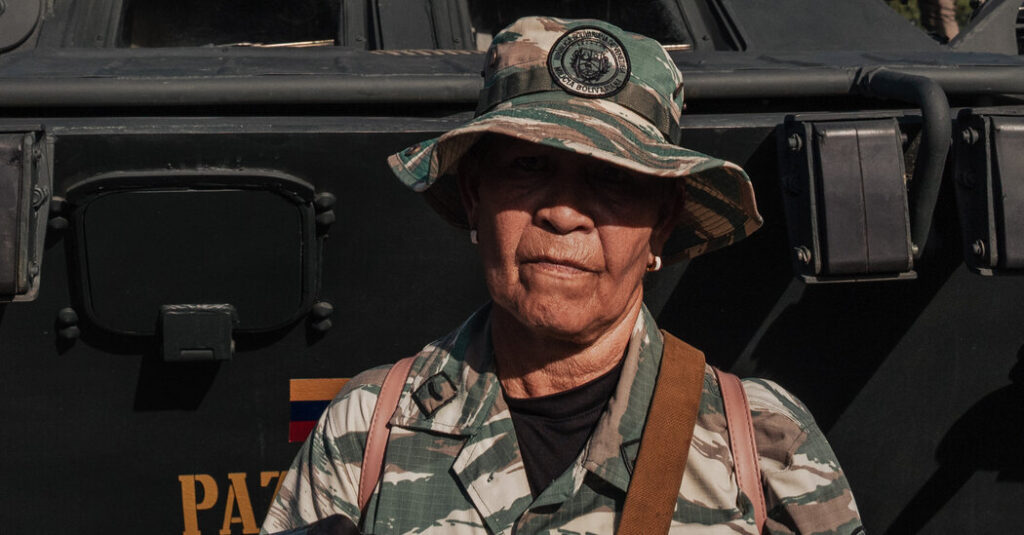As President Trump pressed during his first term to oust President Nicolás Maduro, U.S. officials ran a war game to assess what the Venezuelan strongman’s fall might unleash.
The results showed that chaos and violence were likely to erupt within Venezuela, as military units, rival political factions and even jungle-based guerrilla groups jockeyed for control of the oil-rich country.
Those unclassified findings, supported by other expert analysis, underscore the risk associated with Mr. Trump’s second-term push against Mr. Maduro.
While Mr. Trump has not explained his precise goals regarding Venezuela, he has described Mr. Maduro as an outlaw and an enemy of the United States, and has moved troops, warships and aircraft within striking distance of the country.
On Monday, Mr. Trump said he was open to speaking with the Venezuelan leader but would not rule out a ground invasion to support his stated goal of stopping the Maduro government’s complicity in drug trafficking into the United States.
Since early September the U.S. military has conducted at least 21 strikes on boats near Venezuela’s coast, killing at least 83 people who the Trump administration says were carrying drugs toward the United States.
Venezuela’s Nobel Prize-winning opposition leader, María Corina Machado, stands ready to replace Mr. Maduro, who is widely seen as having stolen a 2024 presidential election that Ms. Machado’s movement easily won. Ms. Machado says that she would assume power with a popular mandate and a transition plan ready to implement on Day 1.
But analysts warn that the troubled recent history of U.S. regime-change interventions in places like Iraq, Afghanistan and Libya could play out again in a post-Maduro Venezuela.
“The thing that really worries us is that they don’t appear to have any serious plan for what happens afterward,” said Phil Gunson, a senior analyst at the International Crisis Group and the author of a new report on the subject.
“The idea that you’re going to be able to slot in a government and everything else will just fall into place, I think is just fantasy,” added Mr. Gunson, speaking from the Venezuelan capital of Caracas.
The U.S. government war games — exercises in which officials and experts convened to plot out the possible consequences of Mr. Maduro’s fall — were recounted by Douglas Farah, a national-security consultant who specializes in Latin America and who joined several such exercises while a fellow at the National Defense University. Participants included officials across the U.S. government, including ones from the Pentagon and State Department.
Mr. Maduro’s overthrow — whether by military coup, popular uprising or U.S. military action — would shatter Venezuela’s brittle authoritarian government and produce “chaos for a sustained period of time with no possibility of ending it,” Mr. Farah wrote in an unclassified report to Pentagon officials after an exercise conducted in 2019.
Mr. Farah first spoke about his participation in the war games in an interview earlier this month with the SpyTalk podcast.
Officials in the Trump White House believed in early 2019 that Mr. Maduro was vulnerable, in part because of popular protests that Washington had encouraged. Mr. Trump considered military options but decided against that approach, then watched in frustration as Mr. Maduro quashed the protests.
Mr. Farah, a former journalist, said that Venezuela would be better off without Mr. Maduro but warned in an interview that “you can’t have an immediate seismic shift” in the country’s government without dire consequences.
“You would have no command and control over the military and no police force,” he said. “You’d have looting and chaos.” Any U.S. military deployment meant to stabilize the country would probably require tens of thousands of troops, he said.
Those conclusions were echoed in the Crisis Group report, which found that a new government installed in Caracas with U.S. and regional backing might face “a potentially protracted, low-intensity conflict.”
Asked for comment, and whether the United States had planned for Mr. Maduro’s potential exit, a senior administration official said only that the Trump administration “is well aware of all outcomes that would occur as a result of any actions that may or may not happen.”
Ms. Machado has said publicly that she has a plan for a smooth transition to power and can assert full control of the country if Mr. Maduro exits. On Tuesday, she released a “Freedom Manifesto” pledging to defend basic rights and to hold Maduro’s “criminal regime” accountable for “crimes against humanity.”
But the opposition would face huge challenges in asserting authority over legislators, governors, bureaucrats, security officials and soldiers chosen or cultivated for years by Mr. Maduro, particularly among those who fear retribution.
“Many senior military officers could resist regime change,” the Crisis Group report warns.
Even if Mr. Maduro agreed to transfer power to a U.S.-friendly successor, some security forces could still rebel “and even wage a guerrilla-type war against the new authorities,” the report says.
A spokesperson for Ms. Machado did not respond to a request for comment.
Other armed groups in the region might oppose a transition or exploit a power vacuum. Thousands of battle-hardened fighters who belong to neighboring Colombia’s National Liberation Army, or ELN, are based in jungles along the border. The group has pledged to defend Maduro’s government and to fight any foreign forces in the region; its arsenal includes explosive devices and some armed drones.
Disorder and conflict could trigger an exodus of Venezuelans, swamping neighboring countries that already struggle to handle millions of migrants who have fled Mr. Maduro’s rule in recent years.
Maintaining order across the country would be a huge task, especially without the full allegiance of heavily pro-Maduro security forces.
A 1994 U.S. military mission in Haiti that deposed a military junta and stabilized the country required some 25,000 personnel. Venezuela is about 33 times larger than Haiti, or roughly twice the size of California.
The 1989 U.S. invasion of Panama, a country less than one-tenth the size of Venezuela, involved about 27,000 U.S. forces.
That operation led to the quick capture of the Panamanian dictator Manuel Noriega — who, like Mr. Maduro, was indicted on U.S. drug-trafficking charges and considered an illegitimate ruler by Washington. Months earlier, Mr. Noriega had nullified the apparent election of an opposition leader, Guillermo Endara, as president.
U.S. officials pushed Mr. Endara to assume power, despite his deep reservations about the American invasion. He was sworn in as Panama’s president on a U.S. military base. But amid resentment over the circumstances of his installation, Mr. Endara faced street protests, uprisings and plunging popularity.
Mr. Endara even staged a hunger strike just over a year after the invasion to pressure the George H.W. Bush administration into sending aid it had promised to Panama — a reminder that Washington can quickly lose interest once the shooting stops.
Asked during a visit to Canada last week whether Mr. Noriega’s capture might serve as a kind of model for the Trump administration’s current planning, Secretary of State Marco Rubio deflected, saying he had been in high school at the time.
The U.S. goal in Venezuela, he added, is “to stop these terrorist organizations from flooding our country with drugs. And that’s what we’re in the process of carrying out.”
What exactly that means remains unclear.
Mr. Maduro has so far refused to leave power and go into exile — perhaps understandable, Mr. Gunson of the Crisis Group said. Mr. Maduro faces an International Criminal Court probe that could make him an internationally wanted man.
Nor does exile assure physical safety. In 1979, Nicaragua’s anti-communist strongman, Anastasio Somoza Debayle, surrendered power and took refuge in friendly Paraguay — only to be ambushed and killed the next year by leftist militants armed with machine guns and a bazooka.
“The Trump administration premise is that if you just ratchet up the pressure sufficiently, then Maduro will get scared and decide to leave,” Mr. Gunson said. “But you can’t do it just by dropping a few bombs and hoping that Maduro will surrender.”
Michael Crowley covers the State Department and U.S. foreign policy for The Times. He has reported from nearly three dozen countries and often travels with the secretary of state.
The post U.S. Ran a War Game on Ousting Maduro. Venezuela Fell Into Chaos. appeared first on New York Times.




